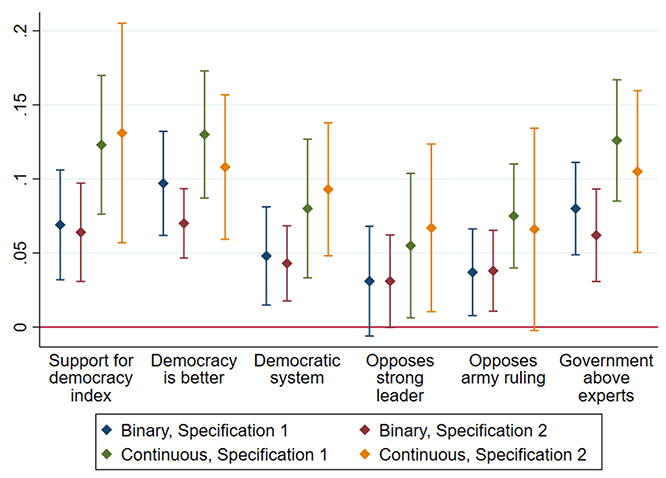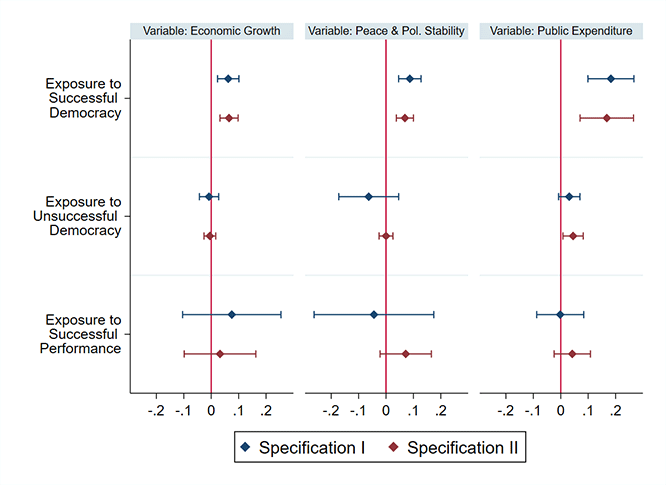Concerns about the viability of democracy have deepened in recent decades amid growing discontent between and among voters, the rapid spread of misinformation, and the rise of extremist and populist parties across the West. Using large-scale survey data covering more than 110 countries, this column shows that individuals with longer exposure to successful democracies tend to exhibit stronger support for democratic institutions. Democracies breed their own support – but only when they can successfully deliver on promises of economic growth, peace, political stability, and the provision of essential public goods.
Are we witnessing the twilight of democratic institutions around the world? Freedom House reports that democracy has been in retreat globally for 14 consecutive years. Concerns about the future viability of democracy have multiplied with the growing discontent among voters in many democracies, the rapid spread of misinformation and extremism (e.g. Sunstein 2018, Marantz 2020), and the rise of authoritarian-leaning populist parties in several Western countries (Algan et al. 2017, Judis 2016, Muller 2017, Edwards 2019, Guiso et al. 2017).
A critical factor that may shape the future of democracy is support from those who have lived under democratic institutions. The idea that democracy needs to be defended to survive is almost as old as democracy itself, going back to ancient Athens (Ober 2015). In modern times, when asked whether his new country had a republic or a monarchy, Benjamin Franklin quipped: "A Republic, if you can keep it". If citizens have a good experience with democracy, they should be more willing to support it.
The Poet Laureate of the UK, John Betjeman, had a candid but revealing take on this subject: "Our nation stands for democracy and proper drains". Recently, President Joe Biden returned to this theme when championing his infrastructure and fiscal plans: "We have to prove democracy still works – that our government still works and we can deliver for our people. In our first 100 days together, we have acted to restore the people’s faith in our democracy to deliver" (Biden 2021).
In a recent study (Acemoglu et al. 2021), we show that people who live in democracies tend to support democracy and oppose authoritarian and army rule. Importantly, these effects are driven by those who have experienced successful democratic periods in terms of GDP growth, relatively high public expenditure, peace and political stability.
Exposure to democracy and support for democracy
Using data covering more than 110 countries and exploiting within-country, between-age-group/cohort variation, we examine whether age groups exposed to longer democratic spells (as well as longer successful democratic spells) express greater support for democracy relative to other age groups in the same country and the same age groups in other countries (who have experienced different timing of democratisations and democratic reversals). To do this, we control for country, year, cohort, and age fixed effects, and in our more demanding specifications we add age times subregion or age times country fixed effects. We also explore the effects of exposure to democratic institutions using both binary and continuous measures of democracy.
Figure 1 summarises our first key finding: exposure to democracy has a stable and statistically significant effect on various measures of support for democracy across outcomes and specifications. We bolster these baseline findings using an instrumental-variables strategy exploiting regional democratisation waves and focusing on immigrants’ exposure to democracy before migration. In all cases, the timing and nature of the effects are consistent with a causal interpretation.
The estimated effects are not just statistically significant and stable, but quantitatively meaningful. For example, focusing on the ‘Support for democracy index’ outcome (and using the estimate reported with a binary treatment variable in Specification 1, a 20-year difference in exposure is predicted to increase this variable by 8% of its standard deviation. This magnitude is similar to the difference in the average ‘Support for democracy index’ between Hong Kong (or South Korea) and China (9% and 12%, respectively), and more than half of the difference between the US and Argentina (13%).

Source: Acemoglu et al. (2021).
We further support the (causal) interpretation of the estimates shown in Figure 1 by carrying out a series of falsification exercises. Democratic experience before the birth of an individual appears to have no impact on his or her support for democracy, and we find no evidence that exposure to democracy shapes non-political views, such as attitudes towards neighbours or religion. These falsification exercises, and estimates I–IV, are reassuring against concerns that our exposure to democracy variables may be confounded by various secular trends impacting both democracy and social attitudes.
To earn support, democracy needs to deliver
We also show that support for democratic institutions is closely linked to democracy’s ability to deliver on pledges of economic prosperity, peace and stability, and public good provision (see Figure 2). This is a prevalent idea among democratic political leaders. Popular accounts of democratic discontent are also consistent with this idea, often pointing to the failure of democratic regimes to deliver on their promises (e.g. Deneen 2019, Mishra 2017, Snyder 2017) and emphasising the corrosive role of rising inequality or declining trust in democratic societies (Fukuyama 2018, Judis 2016). However, there is relatively little empirical evidence on the importance of these factors.

Source: Acemoglu et al. (2021).
We find that the relationship between exposure to democracy and support for democracy is almost entirely accounted for by individuals with exposure to democratic institutions that have functioned well and led to economic growth, peace and political stability, and high levels of public good provision. In contrast, exposure to democracies that are unsuccessful in these dimensions does not increase support for democracy.
Areas for future research
Our study uncovers some important effects of political institutions on political attitudes, values, and culture. There are at least three important directions for future research within this broad area. First, our analysis begs the question of whether support for democracy matters for the survival and efficient functioning of democracy. Second, the specific mechanisms linking exposure to democracy and support for democracy need to be explored further. Third, another topic requiring research is whether information about the performance of democratic institutions presented by the media and other sources influences support for democracy, and whether the spread of misinformation by various media outlets and in social media alters the relationship between successful democratic performance and support for democracy.
This article first appeared on www.VoxEU.org on September 15, 2021. Reproduced with permission.






